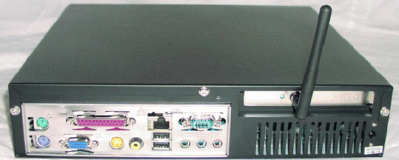Linux-based wireless mesh suite adds crypto engine support
Sep 24, 2004 — by LinuxDevices Staff — from the LinuxDevices Archive — 2 views The first commercial software product to exploit the cryptographic acceleration engine in newer Via processors has hit the market, according to Via. LocustWorld's MeshAP-Pro is a commercial version of MeshAP, Linux software for self-organizing networks of wireless access points. MeshAP-Pro targets larger mesh network operators such as urban service providers.
The first commercial software product to exploit the cryptographic acceleration engine in newer Via processors has hit the market, according to Via. LocustWorld's MeshAP-Pro is a commercial version of MeshAP, Linux software for self-organizing networks of wireless access points. MeshAP-Pro targets larger mesh network operators such as urban service providers.
In addition to selling and supporting MeshAP-Pro software, LocustWorld also offers blackbox hardware platforms for wireless routers, such as the MeshBox, a Linux-based mini-ITX system based on Via mini-ITX boards.

LocustWorld sells Linux-based blackboxes for wireless routers based on Via mini-ITX boards
The processors in newer Via mini-ITX boards based on C5P Nehemiah cores include the PadLock Hardware Security Suite, which includes the PadLock RNG (random number generator) and the PadLock ACE (advanced cryptography engine). PadLock ACE performs low-level processing of the algorithms used in AES (advanced encryption standard), a kind of cryptography defined by US government standards.
According to LocustWorld CEO Richard Lander, PadLock engines enabled LocustWorld to write software that achieves extremely high throughputs of encrypted data, when run on Via boards or boards from vendors such as WinSystems, VersaLogic, Yamashita and many others that use Via Centaur processors. “Using the on-die AES encryption from the latest VIA processors we can achieve an encryption layer with hardly any overhead on the CPU. Network performance using the VIA PadLock ACE is close to the speed of un-encrypted communications, achieving high-strength encryption without the associated performance impact, even on large networks with high traffic. The result is virtually transparent encryption,” Lander stated.
Via last week released a PadLock SDK (software development kit) for those interested in using the security-oriented x86 instructions available on Via processors with PadLock Hardware Security Suite. The kit includes tools, documentation, and example code that developers can “directly copy into other programs.” Example code includes zip compression utilities, and a data-scrubber said to make deleted files “virtually unrecoverable.”
Via has launched a PadLock Certification Program to assist ISVs (independent software vendors) in adding PadLock support to their applications. More details about VIA PadLock initiative are available online.
This article was originally published on LinuxDevices.com and has been donated to the open source community by QuinStreet Inc. Please visit LinuxToday.com for up-to-date news and articles about Linux and open source.